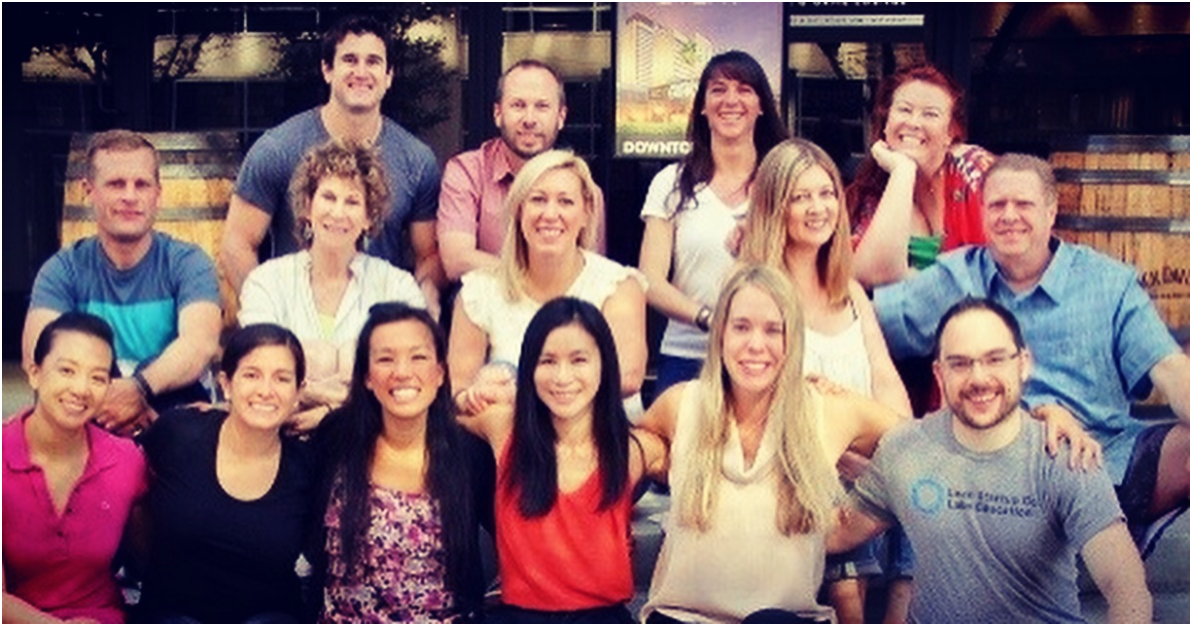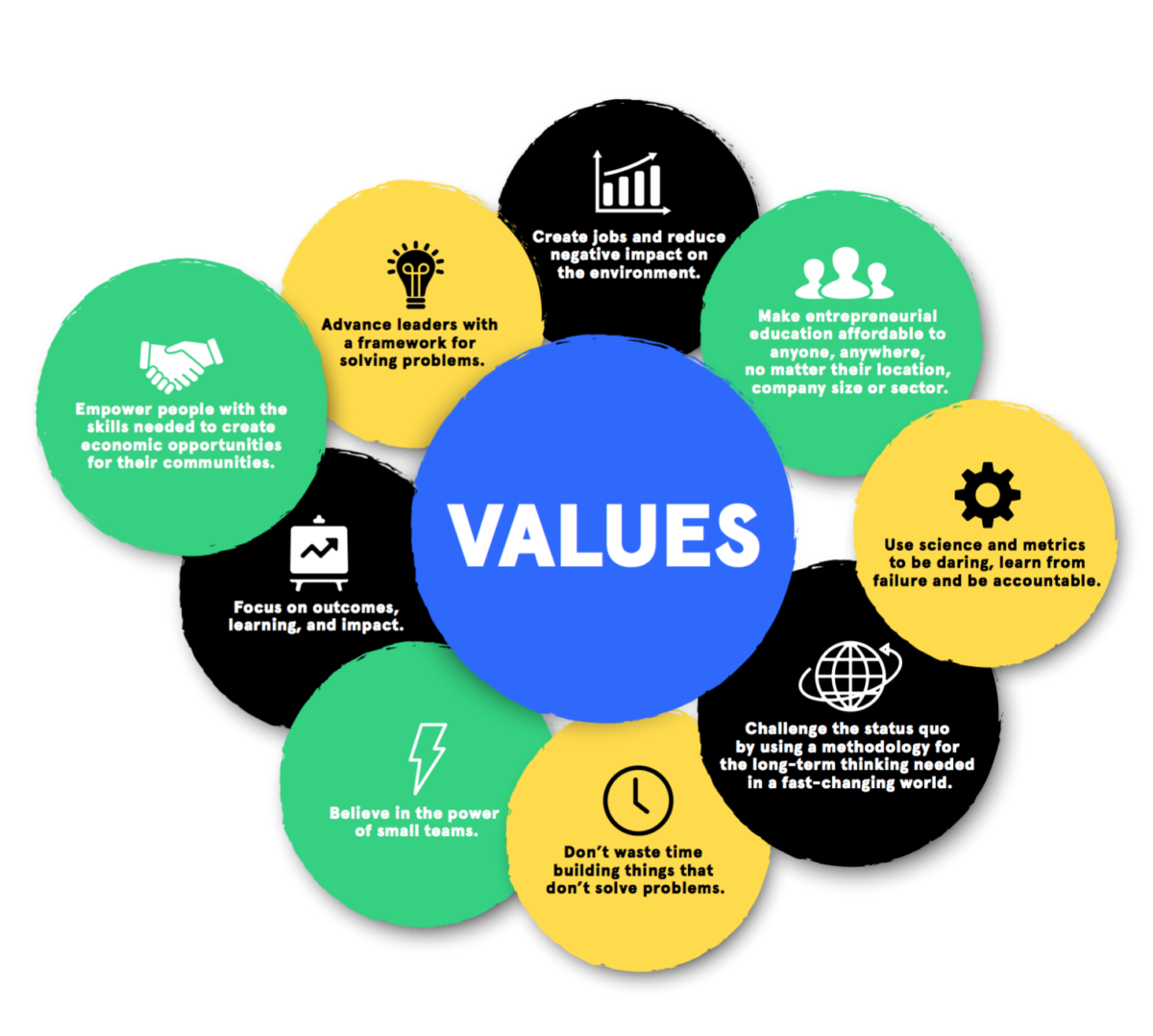The Values Series, Part I: Transforming How We Think and Work in the 21st Century

I can hardly believe it myself, but this year marks the 10th anniversary of the modest proposal Eric Ries first posted on his Startup Lessons Learned blog. Reactions to his observations were swift and enthusiastic, launching a movement that would culminate in The Lean Startup being published three years later.
It’s been three years since Eric and I joined forces to assemble the Lean Startup Company, with a vision to transform the way people think and work in the 21st century. In a world full of uncertainty, we believe in empowering organizations of all sizes and sectors to leverage the power of entrepreneurship as a core function. This can help smaller companies make a stronger impact on the world, and larger companies think more like startups.
In a world full of uncertainty, we believe in empowering organizations of all sizes and sectors to leverage the power of entrepreneurship as a core function. -@mcgough_heather Share on XIn one way, the past 10 years have zipped by, but in another it’s hard for me to remember a time before the business world embraced a formalized set of Lean Startup values. Just think for a moment of how different the world was in 2008. An Android meant a robot, a hybrid cloud meant rain in the forecast, and twitterpated referred to the wise old owl in Bambi. We shopped for desktop computers at Circuit City, browsed the movie walls at Blockbuster, and trusted our money to Lehman Brothers.
Since then, a tidal wave of bankruptcies and innovations reshaped the commercial/cultural landscape. Three trends crested nearly simultaneously: the global financial crisis, massive upgrades in connectivity, and the emergence of self-assembling transcontinental supply chains. The new world molded by these seismic shifts favors survival of the leanest.
As our company built relationships and developed ways to support the community, we were guided by a core set of values. We knew the only way to deliver on the mission of the Lean Startup Co. was to become a model organization ourselves. I’d like to share a little more about those core values, how they were expressed by those Lean Startup methods and how they have helped define our journey over the years.
Just think for a moment of how different the world was in 2008. An Android meant a robot, a hybrid cloud meant rain in the forecast, and twitterpated referred to the wise old owl in Bambi. -@mcgough_heather Share on XDon’t waste time building things that don’t solve problems.
Lean for consumer goods: Procter & Gamble built an empire on household goods over the past eight decades, but trends in global consumer purchasing are starting to evolve faster than their ability to react. CTO Kathy Fish said, “We were spending a lot of money, sometimes before we really should have.” Lean Startup methods helped them switch allegiance from selling solutions to solving problems. “When you fall in love with the problem and not the solution it opens your mind up in a really different way,” she said. “So now we’ve shifted to a more metered funding approach. And we’re finding on some of our biggest programs that we’re learning faster, we’re getting to the consumer a lot faster, and we’re spending 25 to 50 percent less money along the journey.”
Believe in the power of small teams.
Lean for healthcare: Teams are the atomic unit of action in business. From the largest conglomerate to the smallest sidepreneur collective, the effectiveness of the team defines the success of the operation. At the traditional healthcare provider Humana, the Lean Startup transformation didn’t happen all at once. It grew from a single team with a vision. Geeta Wilson, Humana’s VP of Consumer Experience and Enterprise Transformation, said she couldn’t wait for the organization as a whole to adopt Lean Startup, so she took her stakeholders’ permission to do a reframe and just ran with it. “I think we had a significant influence in that we said, ‘It starts with us.’” It did and then rippled across their org chart, success by success.

Focus on outcomes, learning, and impact.
Lean for financial services: Banks, insurance, and other partners in finance, both business and personal, have been struggling to regain the public confidence after many years of uncertainty, and a host of disruptive FinTech competitors. The most progressive financial services leaders acknowledged that it was time to think and act quickly, or be forgotten. Ignacio Julia Vilar, Chief Innovation Officer at ING Banking, laid out how he led his executive team in a new direction, “The first thing that we said is what [innovation] is not about. It is not about gadgets or new technology, necessarily. What you really are trying to do is create a different set of customer experiences… In other words, to help customers reach their dreams.”
Advance leaders with a framework for solving problems.
Lean for social good: How do you help idealists become practical problem-solvers? How do you give them the support they need to fail if necessary, to learn from every interaction, and redirect their resources when it makes sense? Cynthia Jaggi, founder of GatherWell, suggested, “We infuse lean startup principles both in our curriculum and in our approach to developing GatherWell. Every week we send out experiments in leadership and life – simple ways people can shift their perspective or increase their impact. Each one is a mini-test in itself.”
How do you help idealists become practical problem-solvers? How do you give them the support they need to fail? -@mcgough_heather Share on XMake entrepreneurial education affordable to anyone, anywhere, no matter their location, company size or sector.
Lean for developers: You don’t have to start out big to get Lean. Even companies with less than 50 employees, like the development house Carbon Five, posted substantial performance improvements simply by reevaluating employee contributions. Carbon Five’s principal project manager Janet Brunckhorst, discovered that, “Wasting human effort is deeply disrespectful to you, your company, and your product.” As automation and AI assume greater responsibility for carrying out routine tasks, companies of all sizes must discover precisely where humans excel in their organization. In that effort, the framework of Lean Startup methodology will become even more critical. “We really still rely on the creativity of humans, the innovations of humans, the collaborations of humans to produce great products in the world today.”

Lean Forward
We can’t wait to see what other surprises are waiting on the road ahead. If I had to condense all of these stories into a single word, it would be IMPACT. We want to break down the world’s toughest challenges into well-defined sprints, which is where small but supremely effective teams can make the biggest impact. I’m often reminded of a thought from anthropologist Margaret Mead, who said, “Never doubt that a small group of thoughtful, committed citizens can change the world. Indeed, it is the only thing that ever has.”
We want to break down the world’s toughest challenges into well-defined sprints, which is where small but supremely effective teams can make the biggest impact. -@mcgough_heather Share on XThanks to Heather McGough for contributing this piece. If you seek to bring the entrepreneurial spirit to your organization, Lean Startup Co. can help.
